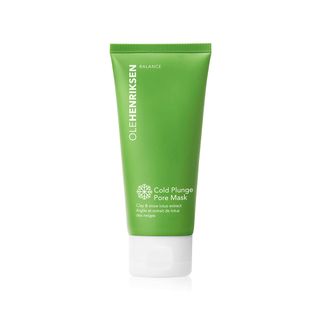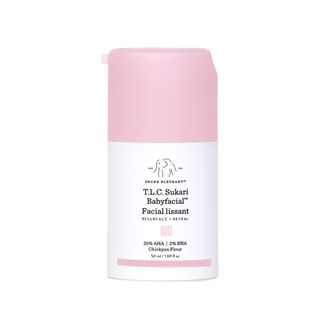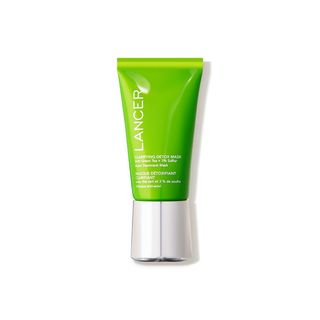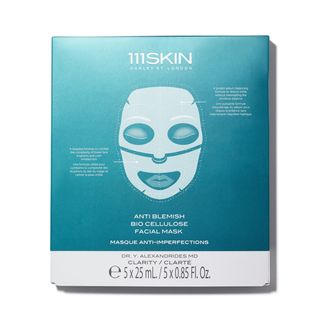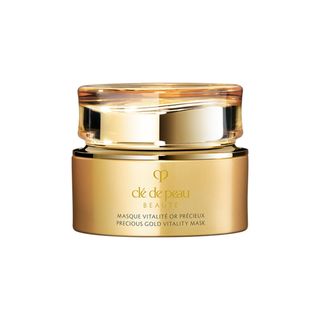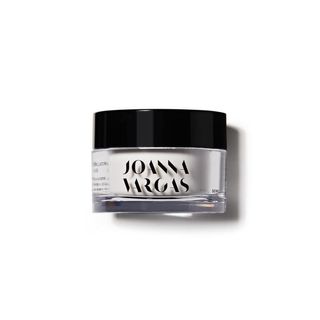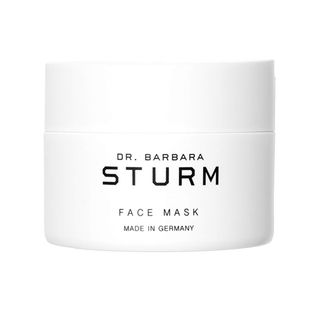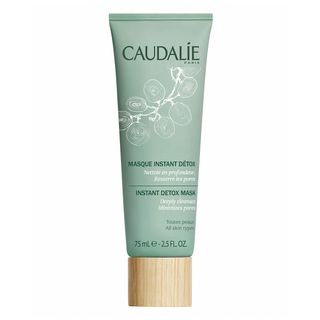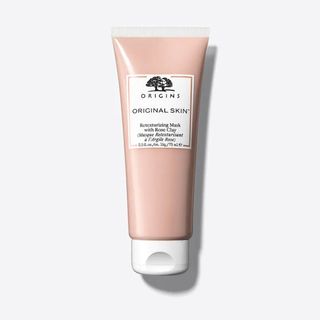How to Choose the Least Irritating Face Mask If You Have Acne
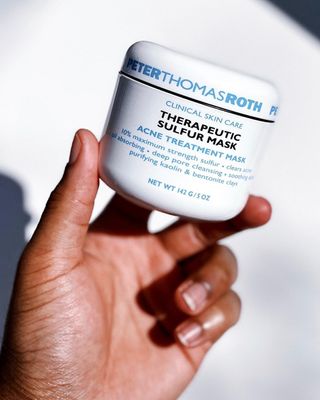
Most of us, at some point or another, get a pimple. (Or two… or three… or four!) But if you're like me, it's less of a once-in-awhile kind of situation and more of a frequent-flyer kind of situation. Honestly, I've been putting more effort into putting less emotional emphasis on the state of my skin this year because, if anything, constantly stressing out about breakouts is only making my skin worse, and I'm just plain over the abusive self-talk. That said, even though I'm diligently working to accept my skin no matter its state of bumpiness, I still want to take care of it to the best of my ability. Slowly but surely, I've honed an effective skincare routine to appropriately care for my acne (here are some helpful tips if you're still in the process of curating your own acne-centric routine), but finding the right wardrobe of face masks to pacify and help heal my bumps and inflammation has continued to be tricky. So I decided to take my quest to the pros: Vanessa Lee, RN, founder of The Things We Do, and Sean Garrette, a New York–based esthetician and global ambassador for Fenty Skin.
Below, you'll not only find their expert-approved faves when it comes to the best face masks for acne, but you'll also gain all of their super-expert intel for how to go about shopping for the best formulas, ingredients, and more. Keep scrolling!
What makes a face mask effective for acne?
"When looking for masks that help treat acne, in general, you want to make sure that the mask has acne-fighting ingredients, that it's not stripping or dehydrating to the skin, and that the mask is free of any known irritants that may exacerbate inflammation and acne," Garrette explains right off the bat.
Not all acne is the same, so paying heed to your specific type of breakout will be paramount when selecting the best formulas to help calm and heal your complexion.
Choosing the Best Face Mask for Your Type of Acne
General congestion:
"Acne is a blanketed term that a lot of people use to describe skin inconsistencies, so let's break it up a bit," says Lee. "There is general congestion that happens most frequently in the T-zone area (forehead, nose, chin) and can be classified as enlarged pores with the occasional blackheads or whiteheads." More often than not, Lee says clarifying clay masks will be most effective in clearing this type of congestion and helping to minimize the look of enlarged pores.
Small, closed comedones:
"There are also more superficial, tiny closed comedones that can also be accompanied by the occasional red, irritated zit (papule) here and there that usually show up in the forehead, cheek, and lower face area, usually in clusters," Lee continues. This type of acne, she says, can be treated with masks containing AHAs and BHAs, which can quickly help smooth out the texture of your skin while simultaneously reducing any redness or inflammation.
Cystic acne:
If you have cystic acne, which Lee describes as deeper, more inflamed, and achy, a mask formula that prioritizes hero ingredients like sulfur or BHAs will likely be your best bet.
"Sulfur works similarly to famous acne fighters like benzoyl peroxide and salicylic acid, but it's a little more gentle," she explains. "If your skin is breaking out because of overuse of products or if it has been stripped too aggressively, causing a vicious cycle of treatment, you may need to reset and really focus on nourishing, calming, and soothing the skin with ingredients like oats or vitamin B5, which has natural anti-inflammatory benefits. Once you get to know your skin more, you can make better decisions based on your needs."
What to Avoid and What to Embrace
Avoid: Peel-Off Masks
Embrace: Sheet Masks
"Peel-off masks are an absolute no-no in my book," warns Garrette. "These masks are usually formulated with strong adhesives that can tug and pull at the skin, which will ultimately cause more inflammation and trauma to the skin, further exacerbating acne and breakouts."
Instead, both Garrette and Lee recommend opting for sheet masks, which, unlike a peel-off mask, will actually infuse more hydration into your skin and might even lend a subtle plumping effect. "Sheet masks are notorious for being hydrating and replenishing on the skin. However, they shouldn't be used as the main treatment for acne," Garrette notes.
Avoid: Gimmicky "Fun" Face Masks
Embrace: Using Multiple Formulas at Once
In the same vein as peel-off masks (which are often marketed as highly satisfying—don't fall for it!), Lee says to avoid other gimmicky types of face masks, like bubble masks, which are more for fun than actual efficacy. Instead, she recommends pinpointing the imbalance triggering your acne so you can apply the right kind of mask accordingly. Often, she says, the best way to do this is to actually apply different formulas to different areas of your face, an extra important tip if you're someone who has combination skin or areas that are much drier or oilier than others.
"I love using two or three masks on my face in different zones because each sector of the face has different needs," she tells us. "For instance, my T-zone could benefit from a completely different mask than my outer cheek area. I always suggest customizing for optimal results."
Avoid: Essential Oils and Citrus Extracts
Embrace: Anti-Inflammatory and Healing Ingredients
If you're having issues with inflammation and acne, Garrette recommends steering clear of face masks rich in essential oils and citrus extracts. Both of these, he explains, can lead to irritation and inflammation, which can both trigger and/or exacerbate breakouts.
On the other hand, some of the very best ingredients for acne include sulfur, salicylic acid, and zinc. "These three ingredients are incredible for treating acne-prone skin," says Garrette. "Salicylic acid is the gold standard for treating non-inflamed acne (think blackheads and whiteheads), and sulfur has powerful anti-inflammatory, antimicrobial, and antibacterial properties." Additionally, he says zinc will also help ease inflammation and relieve the telltale redness and irritation that can come with acne.
Last but not least, famed ingredients like hyaluronic acid, arnica, aloe vera, sodium PCA, and niacinamide won't necessarily fight acne, but they'll treat your skin to a helpful dose of soothing and healing TLC, which will help to simultaneously calm inflammation and keep your skin hydrated and happy.
Avoid: Harsh Charcoal Masks
Embrace: Gentle Clay and Clarifying Masks
Follow Garrette's rule of thumb and do your best to avoid harsh face masks that will strip your skin and rob its natural moisture barrier. Typically, charcoal and low-quality clay masks are the worst offenders.
"These masks can be used as a spot treatment to reduce oil on specific areas, but they can be extremely drying and dehydrating on the skin," he warns. "When your skin is dry and dehydrated, it can lead to an impaired skin barrier, which will exacerbate acne and inflammation." Certain clay masks are okay in moderation and can even be beneficial, but you'll want to take a good look at the ingredients list (take notes on the above) and pay heed to Lee's earlier advice explaining these types of masks are probably best suited for people with general congestion.
The Best Face Masks for Acne, According to Experts
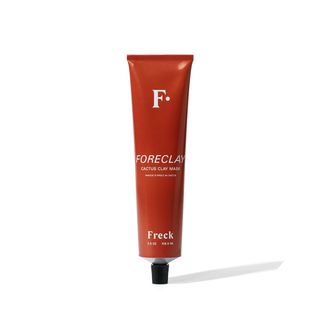
"Masks are a great tool in helping battle acne but do not replace a consistent skin routine," says Lee. "Consistency is key, and it's important to listen to your skin. It will thank you. For oily, congested skin, I love Foreclay by Freck, which has kaolin clay along with prickly pear, which are both known to fight general congestion. I recommend using this once a week and keeping it on for 15 to 20 minutes."
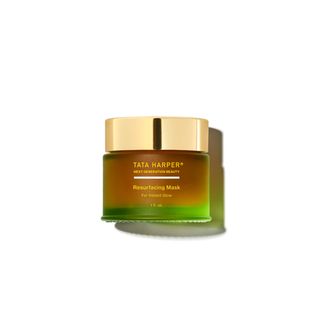
"For superficial breakouts and sporadic papules, I highly suggest using the Tata Harper AHA + BHA mask that contains actives to take care of closed comedones as well as eliminate the bacteria growth causing inflammation in the skin," says Lee. "Apply it once a week and leave it on for 15 to 20 minutes."
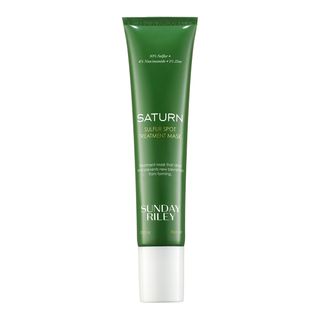
For cystic acne, Lee suggests Sunday Riley's Saturn Sulfur Spot Treatment Mask, which has sulfur, niacinamide, and zinc. "The sulfur works by thinning and softening the skin that can trap a deeper breakout, niacinamide brightens the injured tissue, and zinc stops excess sebum production to prevent a refill of the acne spot. Use this one as needed when you feel an aching in the skin (usually a sign of cystic breakouts). Keep on for 20 to 30 minutes."
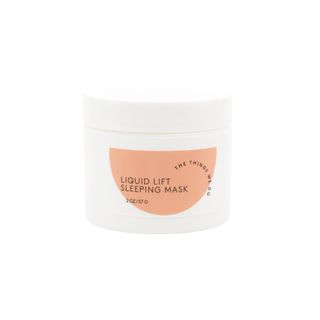
If you have ultra-sensitive, irritated skin that hasn't responded positively to other face masks, Lee recommends the Liquid Lift Sleeping Mask by The Things We Do. "This mask was made to help strengthen the skin's acid mantle and restore what has been overly stripped. Organic oats and pantothenic acid help fight inflammation and soothe the skin."
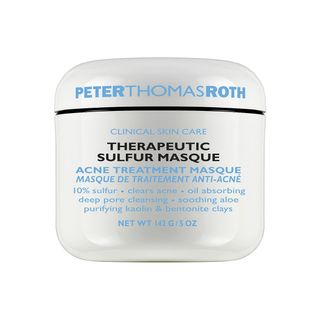
"This face mask can be used morning or night and has a great lineup of ingredients for acne, including 10% sulfur, aloe vera, kaolin clay, and zinc," notes Garrette. "This mask will help treat acne quickly while also calming inflammation. I recommend using it two to three times a week depending on your skin tolerance."
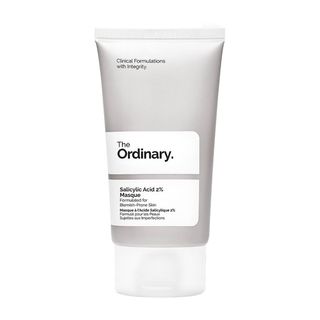
According to Garrette, this a great acne-fighting mask that will help reduce breakouts in addition to evening out the texture and tone of the skin. He suggests applying it once or twice a week for best results.
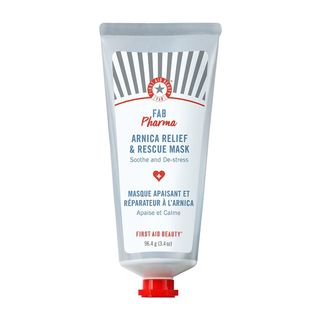
"This is a creamy, hydrating mask that helps soothe dryness, inflammation, and irritation that can come with acne flare-ups," he notes. "It can be used as a 15-minute mask, or you can even leave it on overnight."
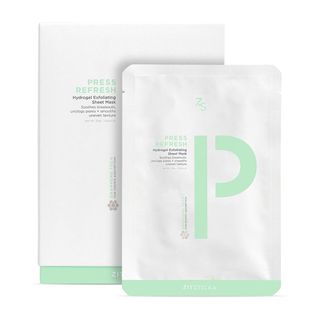
Last but not least, Garrette likes this new tech-savvy mask from ZitSticka, which helps ease a multitude of side effects associated with acne. Yes, it will help to reduce moderate breakouts, but the strategic roster of ingredients will also calm redness, smooth uneven texture, and reinfuse stressed-out skin with essential moisture. He says you can use it once or twice a week, morning or night.
Up next, Foundation for Oily Skin Is Tricky—I Asked Makeup Artists for All Their Secrets
Erin has been writing a mix of beauty and wellness content for Who What Wear for over four years. Prior to that, she spent two and half years writing for Byrdie. She now calls Santa Monica home but grew up in Minnetonka, Minnesota, and studied writing, rhetoric, and communication at University of Wisconsin, La Crosse. She studied abroad in Galway, Ireland, and spent a summer in L.A. interning with the Byrdie and Who What Wear family. After graduating from UW, she spent one year in San Francisco, where she worked as a writer for Pottery Barn Kids and PBteen before moving down to L.A. to begin her career as a beauty editor. She considers her day-to-day beauty aesthetic very low-maintenance and relies on staples like clear brow serum (from Kimiko!), Lawless's Lip Plumping Mask in Cherry Vanilla, and an eyelash curler. For special occasions or days when she's taking more meetings or has an event, she'll wear anything and everything from Charlotte Tilbury (the foundations are game-changing), some shimmer on her lids (Stila and Róen do it best), and a few coats of the best mascara-type product on earth, Surratt's Noir Lash Tint.
